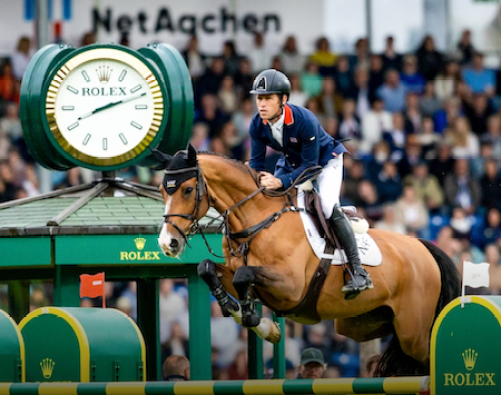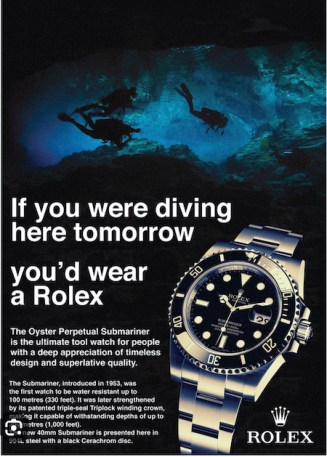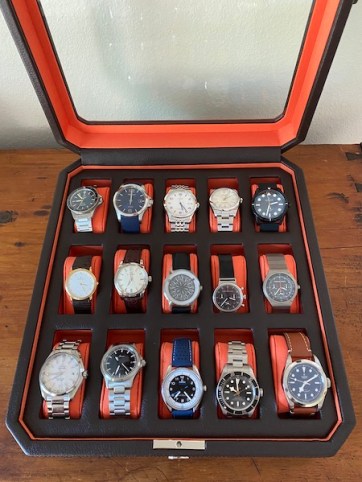
Conversational marketing answers an important question: how do you market a watch that’s been on the shelf a while when you don’t have a million dollar marketing budget? Watchmakers rely on two main drivers: branding and the thrill of the new.
Branding

Rolex spends millions sponsoring upscale sports, making sure there’s a Rolex logo in plain sight. Does generic advertising lead directly to sales? For sure.
Mind you, while watch guys obsess over specific models and features, the majority of Rolex customers want “a” Rolex. Notice that the as above says just that: divers wear “a” Rolex, not a Rolex Submariner..
Combined with carefully chosen celebrity endorsements (a.k.a., ambassadors), everyone knows what a Rolex is: quality status. Thanks to a limited model line, choosing a Rolex isn’t a complicated process, once a customer darkens their door.
No question: Rolex is the master of watch branding. Where Rolex goes, OMEGA and TAG follow, with similar results.
The Thrill of the New – Not So Thrilling?

Saying that, OMEGA Et. Al – including Rolex sub-brand Tutor – also depend on the thrill of the new to capture the attention of the watch media. To keep the brand in front of the horological cognoscenti.
To keep that train chugging along, they introduce minor variations. Now with a green dial! Bronze case! Maybe even a new movement. Something.
Smaller watchmakers who can’t or won’t pay for Rolexian bug bucks branding and paid celebs do this as a matter of course. The end result: a gigantic catalogue of watches.
A recent article pointed out that Audemars Piguet sells nearasdammit 200 different Royal Oaks. I gave up counting the number of Grand Seikos on offer, but it’s close.
Grand who? Yes, there is that. Grand Seiko has done a spectacular job of flying under the radar. And do we really believe that AP created 200 watches because there was demand for so many variations? If only AP made a thin white ceramic smaller-sizes Royal Oak! Then I’d buy.
Conversational Marketing

There is a marketing piece here that players at the sub-Submariner level are missing: customer relations.
I own a LOT of watches. None of them have ever engaged me in what I’d call a conversation. They don’t know why I bought their watch, for one simple reason: they never asked. In fact, they don’t know anything about me.
Oh sure, they have marketing data. Focus groups? Maybe. But here we are, living in a world where every human of earth has the world’s most interactive device in their pocket, and not one watch brand is reaching out to owners.
Strike that. The ones who do send generic emails guessing, hoping that I’ll stump-up my hard earned money for one of their watches. Emails fixated on the thrill of the new.
Brand loyalty isn’t just about people liking or even moving a brand. It’s about people connecting with a brand.
The watch press is a joke, welcoming everything new that comes along with breathless enthusiasm. Bought and paid for, of course. They’re all preaching to the converted, even as they bombard these enthusiasts with watch after watch after watch, making it difficult to choose.
The trick: get closerthanthis to your existing customers. Your best customer, right? Talk to them, not at them. Give them a reason to be a part of your brand, by soliciting and listening to their experiences with your watch.

Need service, a new strap? I know: that’s standard mass mailing fare. How about asking the customer to send you a picture of their watch to give them feedback on its condition?
How many watches do you own? Here’s a beautiful branded case for six watches. We see you’ve got a special birthday coming up. Send us a picture of your collection and we’ll suggest an appropriate watch to complement your collection.
Basically, watch brands should use the internet to automate the kind of service the best watch dealers provide. Dealers who take the time to know you, and not just your watches.
I’m here to say that having a proper, ongoing, professional and caring conversation with a watch customer is the most effective and cost-effective way to market watches. I’m waiting for someone to prove me wrong.

What are your thoughts on brands aiming to treat their customers not as customers, but as stakeholders, involving them at every stage of the design, crafting, marketing, and selling of a watch? Surely wearing a piece that one has contributed to imagine and realize must create the kind of link between brands and customers you’re referring to. I’m thinking of a particular micro-brand but will not name it here.